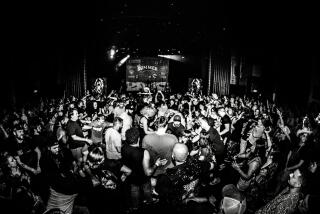Summer ‘97: So Many Tours, So Little Interest
- Share via
Talk to people in the music business about this summer’s festival tours and the wrap-up sounds more like a post-mortem. While there were a few relative successes--Sarah McLachlan’s female-artist Lilith Fair, Ozzy Osbourne’s metal-mad Ozzfest and the extreme-teen Warped package all did fairly healthy business--the assessments of Lollapalooza, H.O.R.D.E., Smokin’ Grooves, Furthur and Roar ranged from “disappointment” to “financial blood bath.”
Ozzfest had the biggest numbers, averaging more than 19,000 tickets for a per-show gross of more than $600,000, in figures collected by Pollstar magazine. Lilith was next with 19,000 tickets and a $465,000 per-show gross. Warped was much smaller (averaging 8,000 tickets and a $155,000 gross), but so were its aims and costs. In contrast, Lollapalooza business was down about 50% from the Metallica-headlined ’96 tour, averaging fewer than 12,000 tickets and $315,000 gross.
Even some of the people behind the tours admit that the field may have gotten too crowded and the format stale.
“There are absolutely too many festivals,” says Stuart Ross, co-organizer and tour director of Lollapalooza, the original role model. “That takes money out of the marketplace and people seem to either buy tickets for just one or they decide very late about what they want to see.”
It was particularly bad for H.O.R.D.E., which was founded by the band Blues Traveler to showcase emerging acts with a neo-hippie patina.
“We had a really tough year,” H.O.R.D.E. overseer David Frey says of the package, in which veteran Neil Young headed a bill that also included such younger acts as Ben Folds Five, Toad the Wet Sprocket and, in some markets, Beck.
“I don’t know how to put it delicately, but Neil Young’s fans didn’t want to come out and sit through the other bands. It was good for Neil, because a bunch of H.O.R.D.E. kids came and saw him and he got new fans. But his fans weren’t there, and when you pay someone of headline status like that, you need him to draw people too.”
Through 12 cities, H.O.R.D.E.’s average was 9,300 tickets for $249,000, way down from last year’s 16,300 and $453,000.
But like people in a leaking lifeboat, the festival organizers seem inclined to take their chances with things as they are rather than jump overboard. Not one of the tour operators contacted by Pop Eye is contemplating packing it in. Only the Iggy Pop-topped Roar, an ill-fated attempt at rock sponsorship by Skoal smokeless tobacco, isn’t expected to return in ’98.
Surprisingly, industry analysts say that they should keep going.
“It would seem that in any other business caution would be the word for next year,” says Stann Findelle, senior editor of concert trade magazine Performance. “But the concept of the package has always been a good one, a bargain for the fans. The packages aren’t stale, but some of the contents are.”
Gary Bongiovanni, editor-in-chief of Pollstar magazine, concurs.
“With the festivals, it’s possible to completely reinvent themselves one year to the next,” he says. “If H.O.R.D.E. has a down year, they can come back strong with a different lineup.”
That matches Frey’s thinking for H.O.R.D.E.
“We’ll try to go with smaller bands, do it cheaper,” he says. “We can still be out there as a brand name.”
More to Read
The biggest entertainment stories
Get our big stories about Hollywood, film, television, music, arts, culture and more right in your inbox as soon as they publish.
You may occasionally receive promotional content from the Los Angeles Times.










